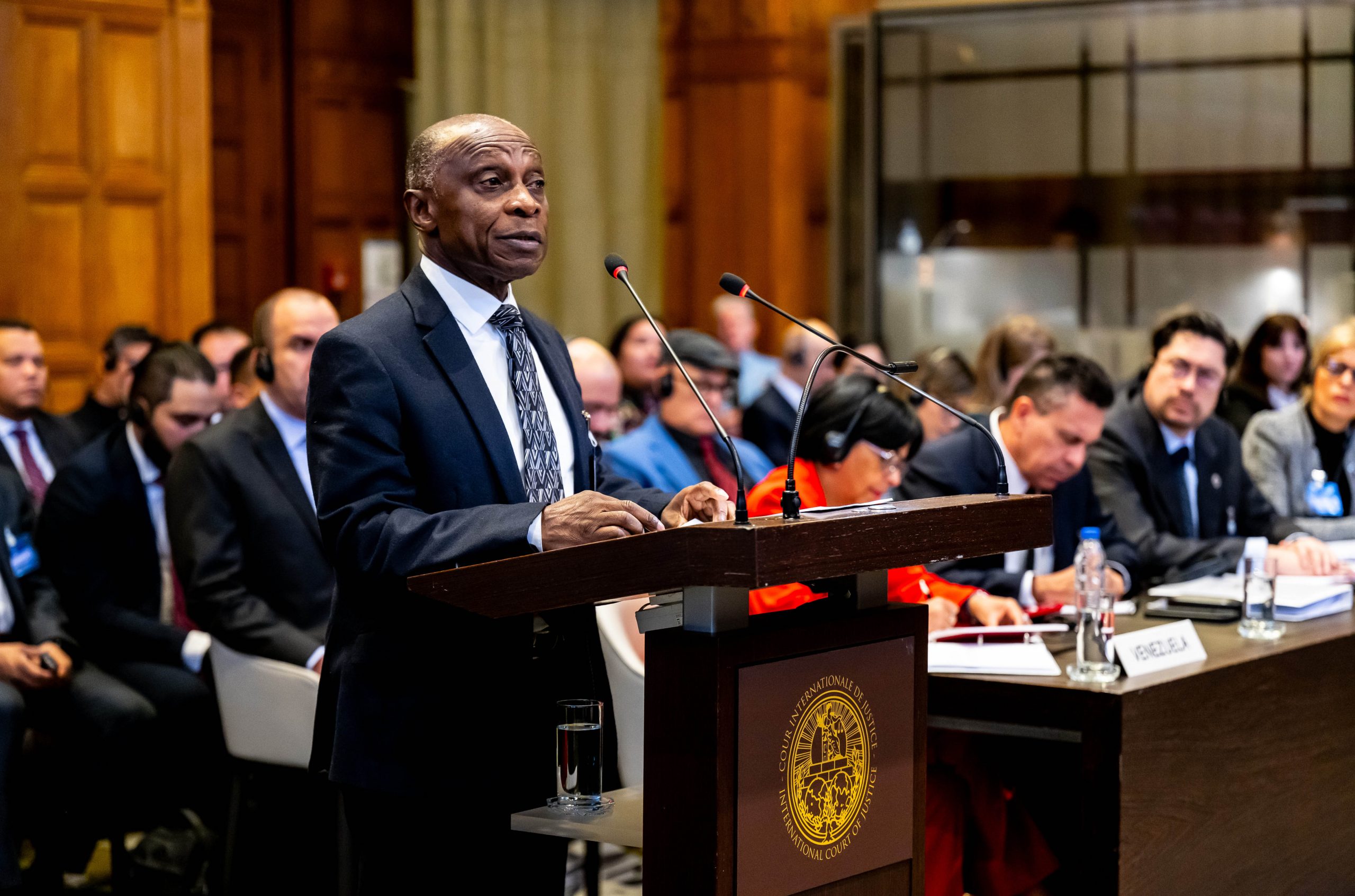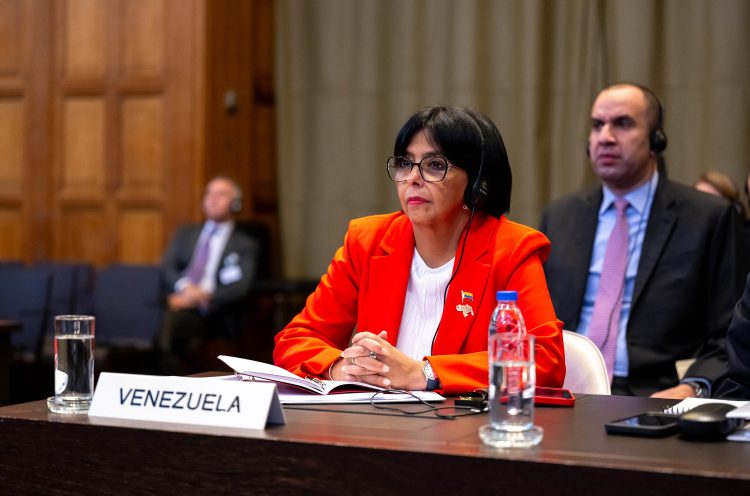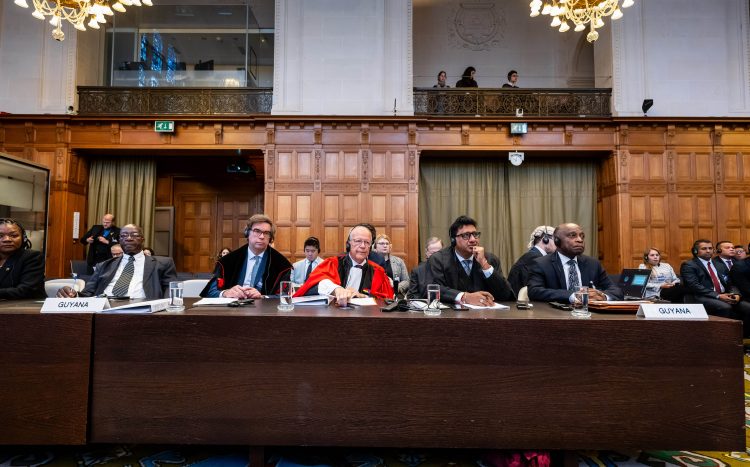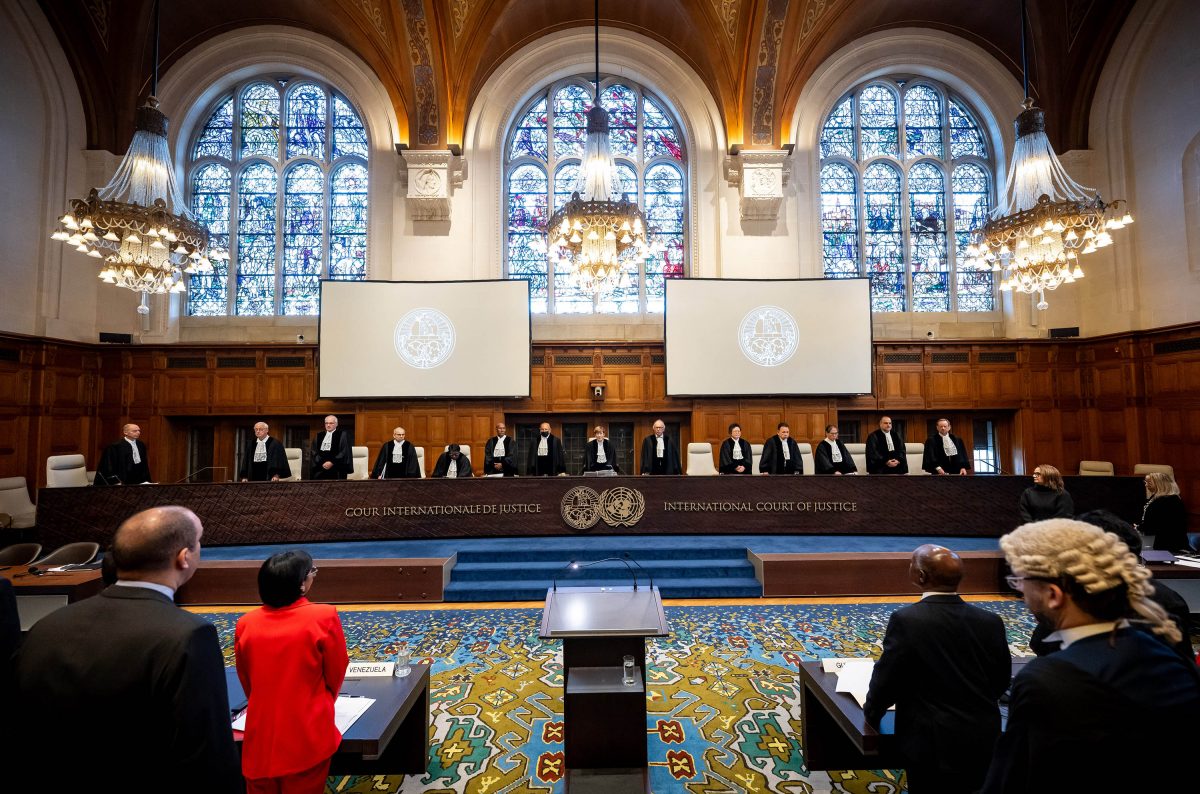Calling the referendum which Venezuela intends to hold on December 3rd, over its claim to Essequibo, an “existential threat ” to its sovereignty and territorial integrity, Guyana yesterday argued at the ICJ in the Hague that Caracas was seeking to evade the jurisdiction of the court and its acts of aggression are intended to lay the path for annexation.
This was the common and repeated theme of the arguments presented by Guyana yesterday before the International Court of Justice (ICJ), which is currently hearing an application from this country for urgent provisional measures in the wake of Venezuela’s pending referendum.
On October 31st, Guyana asked the World Court to schedule urgent oral hearings on its request in advance of the date Venezuela has fixed for what Guyana describes as a “sham referendum.”

With the controversy over the 1899 arbitral award still pending before the Court for final settlement, Guyana has denounced the aggressive new measures taken by Venezuela in furtherance of its claim to Guyana’s Essequibo Region.
The purported referendum is being seen as a move to ratify the Venezuelan government’s apparent decision to withdraw from the present judicial proceedings before the World Court, and proceed unilaterally to incorporate the Essequibo Region into its own national territory as an integral part of Venezuela.
It was out of Guyana’s urgent efforts to seek the protection of the Court, that yesterday’s hearing was convened.

Opening Guyana’s arguments before the 14-member panel of judges, Agent for Guyana to the Court, Carl Greenidge wasted no time in telling the Court that Caracas’ latest move constitutes an “existential threat” to Guyana and to more than two-thirds of its national territory.
Greenidge said it is against this background that Guyana has requested provisional measures; noting that the planned referendum by Venezuela “is designed to obtain an overwhelming popular mandate,” for the Venezuelan government to reject the jurisdiction of the Court, pre-empt a future judgment and in so doing, undermine the authority and effectiveness of the principal judicial organ of the United Nations (UN).
Greenidge said that this signals a refusal on Venezuela’s part to accept the jurisdiction of the Court in adjudicating on the validity of the 1899 Arbitral Award establishing the land boundary between the two States, and the final and binding nature of that boundary.

Greenidge was keen in pointing out that what the referendum in essence seeks to do, is create a new Venezuelan State by annexing and incorporating into its own territory, Guyana’s entire Essequibo Region and to also grant Venezuelan citizenship to the population.
Emphasising that Guyana must therefore safeguard its rights to the county, Greenidge said that any “seizure” of Essequibo by Venezuela would be irreversible, if, in the Court’s judgment on the merits, it rules that the 1899 Award is valid and that Guyana is the lawful sovereign.
He said that not only would the harm to Guyana be irreparable, but that its loss would be permanent.
Underscoring what he said is Guyana’s trust and confidence in the Court which has already given itself jurisdiction to hear the merits of the substantive challenge, Greenidge noted that there is still time that the Court can act, before Venezuela’s attempt to annex Essequibo.
He said that it is the Court alone which stands between a “solution and chaos.” Chaos he said that would threaten peace and security for Guyana, the Caribbean Region and beyond; even as he stressed that it is only the Court which can protect Guyana and its rights.
Therefore, he said, Guyana looks to the Court to safeguard its rights by applying the principles of international law faithfully, fairly and impartially noting that it remains steadfast that the Court would so do.
In his address to the Court, Counsel on behalf of Guyana, Paul Reichler sought to outline the irreparable nature of the harm that would beset Guyana, should Venezuela’s planned referendum be held.
Prejudice
He said that Guyana stands to suffer irreparable prejudice and irrecoverable loss of the territorial right.
Referring to a map of Guyana projected in the court room, with the Essequibo Region shaded, Reichler reminded that it was that territory that was determined to have belonged to British Guiana in the Arbitral Award of October 3rd, 1899.
He pointed to the clear demarcation on the map of the Essequibo belonging to Guyana, as had been fixed by the arbitrators; noting that it was the same boundary that had been demarcated by a joint commission and formally agreed to by Venezuela itself in 1905 and ratified by its national congress.
Reichler was particularly keen in pointing out that it is the very boundary that Venezuela has itself “consistently” recognised, as the international boundary with British Guiana without interruption and without formal protest until 1962.
On this point, counsel for Guyana referenced Venezuela’s clear message in its planned referendum, of seeking to carry out actions that it has already decided to take—which include—the definitive and final rejection of the 1899 Arbitral Award, the rejection of the Court’s jurisdiction in settling the controversy, the refusal of recognising the Court as the means of settlement, the annexation of Essequibo and the defence of the territory against Guyana’s assertion of its rights.
In reference to a video clip of Venezuela’s President Nicolás Maduro, which was played in court, Reichler underscored Caracas having made it clear that its referendum is not merely to assess public opinion, but rather to obtain popular support for decisions its government has already made and a license to act on those decisions.
Never recognized
Translating into English, Maduro’s address to Venezuelans, Reichler noted where the Head of State passionately says that “Venezuela has never recognized, and will never recognize the International Court of Justice as an instance for the attention or resolution of this matter”.
Reichler, an international law attorney surmised that the outcome intended by the Venezuelan government, could not be clearer as the collective decision being called for by its people involves nothing less than the annexation of the territory.
The lawyer said that the move by Venezuela is a text book example of annexation. He rhetorically asked, “what else would we call the creation of a new Venezuelan State comprising the territory, the conferral of Venezuelan citizenship on its inhabitants and the incorporation of the new state into Venezuelan territory?”
He continued, “what would be the effect of Guyana’s rights in that territory…the right it seeks to confirm in these proceedings, after the annexation of the territory by Venezuela takes place?”
How likely is it that Venezuela will ever reverse its annexation, and accept Guyana’s sovereignty over the territory, Reichler further went on to ask; particularly after Venezuela refuses to accept the Court as the means for resolution.
The lawyer told the Court he wished he could say that annexation by one state of another state’s territory was a historical footnote; but he said instead, that “unlawful annexation is an infectious disease like polio” which he said was once thought to have been eradicated, but has re-emerged.
Citing incidents of unlawful annexation around the world, with the most recent meted out to countries such as the Ukraine and the occupied Palestinian territories; Reichler said that what is different in Guyana’s case, is that the Court has jurisdiction, and still has enough time to stop it from occurring, since the intended annexation has not yet taken place.
This, he said, is the reason Guyana submitted its request for provisional measures.
Noting the irreversible harm Guyana stands to face, the lawyer referenced Venezuela’s position which it has made clear, that after the referendum, it will count on its armed forces to defend its annexation.
Projecting on screens in the courtroom, photos of soldiers and a military airfield, and referencing the military preparations which have already begun on Venezuela’s border, Reichler said that it all represents the execution of the plans for annexation.
One video translation showed soldiers calling for combat stating that they were prepared to protect what they claim to be Venezuela’s territorial integrity.
Reichler was followed by French lawyer Alain Pellet who underscored the importance of each of the requests for provisional measures made by Guyana and who argued that the Venezuelan government is attempting to forestall the enforcement of any forthcoming judgment by the court using the peremptory argument of the people’s sovereignty. He argued that the court should not tolerate such a ploy.
He said it was important not to allow Venezuela to create a fait accompli. He said that Caracas posed an immediate threat and that this was not “a paper tiger”.
On behalf of the Guyana delegation to the Court, Greenidge in his closing address reiterated that neither state has any right to sidestep the Court and should allow the final settlement to be sanctioned by the Court.
Venezuela is scheduled this morning to present its response to Guyana’s request for the provisional measures. Its team is led by Vice President Delcy Rodriguez.
Background
Venezuela began issuing threats to Guyana last month despite the fact that the two countries are before the ICJ on the question of the validity of the 1899 arbitral award which settled the boundaries between the two countries.
On September 18, Caracas denounced the award of offshore exploration blocks in Guyana’s waters.
On September 19, responding to the Venezuelan statement, Guyana’s President Irfaan Ali said: “The Government of Guyana reserves the right to pursue economic development activities in any portion of its sovereign territory or any appurtenant maritime territories. Any unilateral attempt by Venezuela to restrict the exercise by Guyana of its sovereignty and sovereign rights will be wholly inconsistent with the Geneva Agreement and the rule of international law”.
Guyana sought the urgent protection of the World Court, by filing with it a Request for Provisional Measures.
In that Request, Guyana seeks from the Court an Order preventing Venezuela from taking any action to seize, acquire or encroach upon, or assert or exercise sovereignty over, the Essequibo Region or any other part of Guyana’s national territory, pending the Court’s final determination of the validity of the Arbitral Award that established the land boundary between our two States, and the final and binding nature of that boundary.
Guyana said it has no doubt of the validity of that Arbitral Award and the land boundary, which Venezuela accepted and recognized as the international boundary for more than 60 years.
Guyana insists, as does CARICOM, the Secretaries-General of the United Nations and Organization of American States, and the entire international community, that the controversy over the validity of the Arbitral Award and the land boundary must be resolved by the International Court of Justice, which will assure a just, peaceful, binding and permanent solution to this matter, in accordance with international law.
In fact, the Court itself has determined, in two separate Orders, that it has the exclusive jurisdiction to resolve this matter, and that it will do so. Twice Venezuela has formally objected to the Court’s jurisdiction, and both times the Court overwhelmingly rejected Venezuela’s objections.
In the interim, pending the oral hearing on its request and the issuance of the Court’s Order, Guyana urges CARICOM and the international community to continue reminding Venezuela of its obligations under international law, including its obligation to accept the ICJ’s jurisdiction, plead its case to the Court, and comply with the Court’s rulings and Judgments.
On October 30th, Guyana requested the Court to indicate the following provisional measures:
“1. Venezuela shall not proceed with the Consultative Referendum planned for 3 December 2023 in its present form;
2. In particular, Venezuela shall not include the First, Third or Fifth questions in the Consultative Referendum;
3. Nor shall Venezuela include within the ‘Consultative Referendum’ planned, or any other public referendum, any question encroaching upon the legal issues to be determined by the Court in its Judgment on the Merits, including (but not limited to):
a. the legal validity and binding effect of the 1899 Award;
b. sovereignty over the territory between the Essequibo River, and the boundary established by the 1899 Award and the 1905 Agreement; and
c. the purported creation of the State of ‘Guayana Esequiba’ and any associated measures, including the granting of Venezuelan citizenship and national identity cards.
The five questions being asked at the Venezuelan referendum are:
Do you agree to reject by all means in accordance with the law the line fraudulently imposed by the Paris Arbitration Award of 1899 that seeks to deprive us of our Guayana Esequiba?
Do you support the 1966 Geneva Agreement as the only valid legal instrument to reach a practical and satisfactory solution for Venezuela and Guyana regarding the controversy over the territory of Guayana Esequiba?
Do you agree with Venezuela’s historical position of not recognizing the jurisdiction of the International Court of Justice to resolve the territorial controversy over Guayana Esequiba?
Do you agree to oppose by all means in accordance with the law Guyana’s claim to unilaterally dispose of a sea pending delimitation illegally and in violation of international law?
Do you agree with the creation of the Guayana Esequiba state and the development of an accelerated plan for the comprehensive care of the current and future population of that territory that includes, among others, the granting of citizenship and Venezuelan identity card in accordance with the Geneva Agreement and international law, consequently incorporating said state on the map of Venezuelan territory?
The Guyana bench (ICJ photo)
Venezuelan Vice President Delcy Rodriguez at the hearing (ICJ photo)






